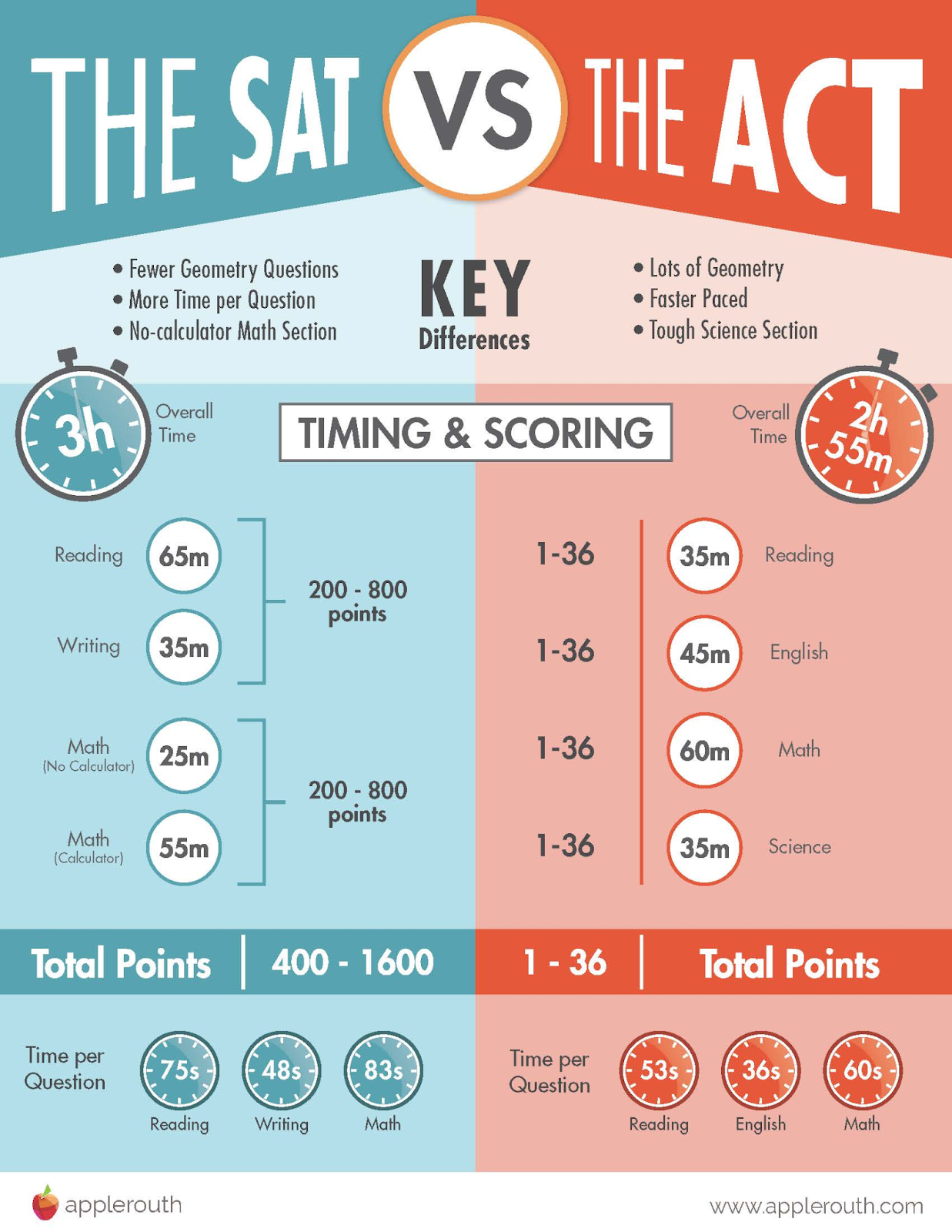SAT
SAT or ACT: Which Exam Should I Choose? 🤔
6 min read•Last Updated on July 11, 2024
Mick Polito
Mick Polito
When it comes to standardized testing, choosing between the SAT and ACT can be challenging. In this guide, you will find information geared to help you in your decision of which of the exams to take (or take both!).
Also, note that while standardized tests have been optional at many colleges and universities for the past few years (and still are currently), it's always a good idea to have a test score or two in hand! Check out our article on whether the SAT is worth it here. FYI, the same principles generally apply for the ACT in that article. 😉
📘 What is the SAT?
What is the SAT? You probably already know what it is because you've heard about it from friends, siblings, etc., but we'll give you a quick breakdown. The SAT, or the Scholastic Aptitude Test, was developed by College Board in 1926 (yes, College Board again) to test college readiness. The test in total is out of 1600 points, with two main sections, English and Math, worth 800 points each. The English section is subdivided into reading and writing, while Math is subdivided into math without a calculator and math with a calculator.
Over 1.7 million students from the Class of 2022 took the test. 🙌

📕 What is the ACT?
So, now that we know what the SAT is, what is the ACT? The ACT, or the American College Test, was created in 1959 and is currently administered by the company, ACT. Though the test is similar to the SAT, there are some differences that you should be aware of before making your choice. The maximum score you can receive is 36, with four sections of English, Math, Reading, and Science. Your score is calculated from the average of your scores on each section (rated from 1 to 36) rounded to the nearest whole number. 🎉
Approximately 1.3 million students from the Class of 2022 took the ACT.

🤷 SAT vs. ACT: What's the Difference?
The SAT and the ACT may look similar, but they are different when it comes to the details. Neither test is necessarily harder or easier than the other, but you might find one test easier than the other depending on where your strengths lie.
| SAT | ACT | |
| Duration | 3 hours | 2 hrs 55 min w/o writing; 3 hrs 35 min w/ writing |
| Score Range | 400-1600 | 1-36 |
| Costs | $55 | 91 w/ writing |
| Sections | 1. Reading: 65 min; 2. Writing and Language: 35 min; 3. Math w/o Calculator: 25 min; 4. Math w/ Calculator: 55 min | 1. English: 45 min; 2. Math: 60 min 3. Reading: 35 min; 4. Science: 35 min; 5. Writing (opt.): 40 min |
| Total Questions | 154 | 215 |
| Accepted by Colleges? | ✅ | ✅ |
📋 Other Major Differences
⏳ Time per Question
Generally speaking, you have more time per question on the SAT than the ACT. So if you're one of those test-takers who needs more time per question (especially for the math section), then consider the SAT! If you're confident with zipping through the questions, the ACT might be the right test for you. It's also important to note that ACT questions tend to be a bit more straightforward, so although you will need to move faster, the questions often require a bit less deliberation.
🔬 Science Section
As you probably noticed, the ACT has a section dedicated to science. Though this doesn't necessarily mean it'll test you on your science knowledge (though it occasionally does), it will test your ability to analyze and interpret scientific experiments and concepts. The SAT, however, has this incorporated in the reading section, so there's less science involved, but you'll still need to know how to read and analyze scientific articles.
#️⃣ Number of Choices
The ACT math section gives you five choices (A-E) for multiple-choice instead of the regular 4 (A-D) as the SAT does. But be careful! The SAT has a student-produced answer section, where you aren't given any choices at all (basically free-response). So if you don't like free-response and would be okay with five choices, shoot for the ACT!
🔢 Math Section
While the SAT math difficulty goes up to Algebra 2, the ACT math difficulty comprises more geometry, statistics, and even pre-calculus! In short, the SAT is heavily algebra-based, while the ACT is heavily geometry-based. If you haven't learned pre-calculus and find algebra easy, the SAT might be your thing. 😊
Additionally, consider that the ACT does not provide geometric formulas, but the SAT does. So, if you don't have your formulas down, you'll need to get them down in order to rock the ACT!
💯 Calculator
The ACT allows you to use your calculator anytime, unlike the SAT, which only allows you to use it for the last section. If you're emotionally attached to your calculator and cannot function without one, you might consider taking the ACT! On either test, getting some important calculator shortcuts down could help you gain some important points, especially on the ACT.
📚 Number of Passages
The number of passages for the reading sections of each test is different as well. The SAT has five passages—one passage from literature, history, social sciences, and two from science. This differs from the ACT, which has four passages from fiction, social studies, humanities, and natural sciences. So if you like less reading, there's the ACT. Keep in mind, however, that you'll have 6-7 passages in the ACT science, but these are short, are filled with visuals, and test different skills from the reading section.
🤓 Reading Section
While studying for the SAT, you might've encountered a question that asks you to choose a quote that serves as evidence and supports your answer from the previous question. Good news! The ACT doesn't have that! However, the non-chronologically organized questions might pose some challenges since the time constraints limit your ability to find every answer in the text. Again, always consider your personal strengths and preferences when choosing between the two tests!
✍️ Optional Essay
Lastly, there is an optional essay for the ACT. Though the SAT did have one in the past, it is no longer offering that optional essay. So if you think writing essays is your strength, you should consider the ACT for that extra section to demonstrate your readiness to colleges and universities.

🪄 Test-Optional
Some schools are going test-optional in an effort to make college admissions more equitable. Though this means you don't have to submit scores to these schools and it won't harm your application, you might still want to take the SAT or ACT to try to boost your chances of admission and to attain scholarships. Also, even if you don't score quite as high as you hope to, you can still choose not to submit your test scores.
💡Conclusion
Once you identify what you're good at, it'll be easier to weigh the pros ➕ and cons ➖ of each test! If you really can't decide, taking both tests might help you figure out which test YOU would prefer 💭 and will let you know which test you are stronger on naturally.
Also, remember, you should always take into consideration graduation requirements for your school and your state. 🏫
Good luck with your standardized test! If you get lost, make sure to consult your school counselor, friends, teachers, and parents! And when you're studying for either test (or both!), make sure to check out Fiveable for study resources! Happy studying! ⭐